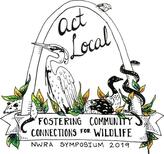Reptiles Abstracts
|
Full Abstract
Snakes are some of the most misunderstood animals. It is amazing and inspiring to witness interest and caring increase for these unique species. Woodlands Wildlife Refuge is permitted to care for snakes, including venomous, and we have seen a major increase in snake rehabilitation needs since 2013. There are 23 species of snakes in New Jersey including two venomous species. Not all reptiles are the same. Snakes have specific needs per species, age, and injury when it comes to housing, nutrition, lighting, temperature control, and more. This session covers basic care and housing for common snake species, common intake reasons, and interesting cases. |
Turtle Shell Repair:
Let's Get Crackin' Julia Becker, DVM Tippecanoe Animal Hospital Watch Video (Login required) Full Abstract
Topics include turtle basics from intake to endpoint. This overview includes an exam of the turtle at intake for assessment of overall health and severity of injuries to determine prognosis. Triage priorities are covered--hydration, pain management, wound care and antibiotic usage. Anesthesia protocol options are briefly mentioned, as anesthesia is required for the more invasive shell repair methods. Discussion includes a comparison of several shell repair techniques step-by-step with pros and cons of each and provides a list of recommended supplies, equipment, and reference resources. |
The Approach to
the Head Trauma Turtle Leslie Reed, The Wildlife Rehabilitation Center of Minnesota Watch Video (Login required) Full Abstract
Head trauma is one of the most common injuries wild turtles experience after being struck by a vehicle. A full assessment of the patient's neurological status, soft tissue and skeletal trauma of the head and face, and feasibility of repair must be made on admission or shortly thereafter. This lecture discusses the most common presentations of the head trauma turtle, how to perform a neurological exam, fracture and wound assessment, and euthanasia recommendations. Basic facial fracture repair techniques are also be discussed. |
|
Turtle Workshop Lecture
Mark Mitchell, DVM, MS, PhD, DECZM, Louisiana State University Watch Video (Login required) Full Abstract
This lecture provides participants with an overview of basic turtle rehabilitation skills, including how to complete a thorough physical examination, develop a differential list, and institute appropriate therapy. Specific reviews of infectious diseases of chelonians, therapeutic planning (fluids and other medications), and nutrition for captive chelonians (esophagostomy tubes) are discussed. |

